|
|
|
Sort Order |
|
|
|
Items / Page
|
|
|
|
|
|
|
| Srl | Item |
| 1 |
ID:
092378
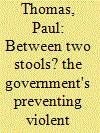

|
|
|
|
|
| Publication |
2009.
|
| Summary/Abstract |
The 7/7 London suicide bombings of July 2005 and numerous subsequent Islamist terror plots have highlighted the reality of an 'internal' threat to Britain. One governmental response has been the 'Preventing Violent Extremism' (PVE) programme. Whilst the educational aspect of its focus on Muslim young people is to be welcomed, there are serious concerns as to whether PVE policy, as currently designed, is falling between two stools. To date, the programme focuses exclusively on Muslim communities in flat contradiction to the integration policy priority of community cohesion, so risking further defensiveness from Muslim communities and resentment from white working class communities. Whilst ignoring the right-wing extremism growing in some of those white communities, PVE work with young people is actually failing to engage openly and robustly with the real political issues driving Muslim anger and minority extremist support. The confidence, understanding and skills of educational practitioners are vital here.
|
|
|
|
|
|
|
|
|
|
|
|
|
|
|
|
| 2 |
ID:
166540
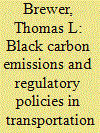

|
|
|
|
|
| Summary/Abstract |
The paper assesses evidence concerning the effects of transportation's black carbon emissions on climate change, public health, and food production; and it discusses policy issues posed by the emissions. Black carbon emission mitigation policies at all levels offer significant potential climate, health, and food co-benefits, and they are attractive in terms of economic cost-effectiveness and political feasibility. The paper presents an analysis of regulatory issues in maritime shipping and aviation, which are increasingly salient, and which are largely independent of the revelations of “diesel gate” in the motor vehicle industry. Yet, there are linkages in the technological and policy issues of the motor vehicle industry and issues confronting maritime shipping and aviation. Black carbon emissions are among the core regulatory policy issues in all three industries, and they have not been adequately addressed by policymakers. The paper concludes with specific policy recommendations at all governance levels.
|
|
|
|
|
|
|
|
|
|
|
|
|
|
|
|
| 3 |
ID:
084363
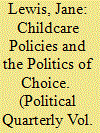

|
|
|
| 4 |
ID:
165220
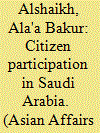

|
|
|
|
|
| Summary/Abstract |
The effects of Arab Spring led to widespread dissent among Saudi citizens, culminating in governmental fear of civil revolt. Thus, the Ministry of Labour introduced many developmental policies such as localisation, women employment that aimed to develop the country and satisfy the needs of citizens to offset rising inflation. These policies were said to be in the best interests of Saudi citizens. This study has therefore intended to investigate the extent to which the Ministry of Labour engaged and consulted with its citizens prior to the introduction of those policies. This study found that Saudi citizens participated via social dialogues, together, social media and digital communication in democratic governance. However, there is a gap in the perceptions of the Saudi elite and citizens regarding the significance of citizen participation in Saudi governance. It was discussed that complete democratic governance cannot be adopted due to autocratic nature of Saudi Arabia.
|
|
|
|
|
|
|
|
|
|
|
|
|
|
|
|
| 5 |
ID:
126653


|
|
|
|
|
| Publication |
2013.
|
| Summary/Abstract |
As Professor Ian Brown's recent work on the colonial prison in British Burma has shown, the proportion of the population convicted of crimes was routinely and markedly higher than in any other province of British India. Part of the explanation for the exceptionally high figures may be the colonial criminalization of practices that were previously lawful. Gambling was one such activity that the British, at least according to their rhetoric, were intent on prohibiting as part of their 'civilizing mission'. However, in practice colonial law was more ambiguous and equivocal. Government prosecutors and judges disputed the definition of gambling and struggled to differentiate it from other tolerated practices. Beyond these legal difficulties, individual British officials often found it necessary to turn a blind eye to gambling. On an everyday level, subordinate officials in the police and magistracy had an ambivalent relationship with gambling. Although empowered to suppress it, some chose to ignore its presence and others still were actively conniving with it. By studying how the British sought to control gambling in the colony at the turn of the twentieth century, this article seeks to restore the full complexity to the history of criminality in colonial Burma.
|
|
|
|
|
|
|
|
|
|
|
|
|
|
|
|
| 6 |
ID:
131062
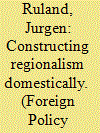

|
|
|
|
|
| Publication |
2014.
|
| Summary/Abstract |
There is a dearth of studies exploring the construction of ideas on regionalism outside Europe. This article seeks to make a contribution to close this gap. It examines the construction of ideas on regionalism in Indonesia, the largest member country of the Association of Southeast Asian Nations (ASEAN). Theoretically, the paper draws from Acharya's concept of "constitutive localization" which it develops further. It offers an alternative explanation to studies which argue that as a result of mimetic behavior, social learning, and cost-benefit calculations, regional organizations across the world become increasingly similar. While this may be the case in terms of rhetoric and organizational structure, it is not necessarily the case at a normative level. The Indonesian case shows that even though foreign policy stakeholders have increasingly championed European ideas of regional integration after the Asian Financial Crisis of 1997/1998, they have skillfully amalgamated them with older local worldviews through framing, grafting, and pruning. European ideas of regional integration thereby served to modernize and relegitimize a foreign policy agenda which seeks to establish Indonesia as a regional leader with ambitions to play a major role in global politics.
|
|
|
|
|
|
|
|
|
|
|
|
|
|
|
|
| 7 |
ID:
138496
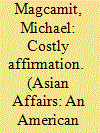

|
|
|
|
|
| Summary/Abstract |
The Barisan Nasional's construction and implementation of ideational and material security apparatuses has created a one-sided internal security dilemma in Malaysia. This paper argues that the noble objective of promoting Malay interests has been transformed to the venal objective of securing Barisan's political perpetuity that is being pursued under the pretext of achieving inter-ethnic parity within a pluralistic Malaysia. The government's quest for a bumiputra-imagined nation gave birth to affirmative action policies that have often worked at the expense of all other Malaysian ethnic groups, particularly the Chinese and Indian-Malaysians. For better or worse, Malaysia's national security is conceived and developed on the basis of bumiputra ethnicity. In other words, Malaysia's national security is designed to counter mainly the insecurities confronting the Malays, thereby generating a one-sided internal security dilemma.
|
|
|
|
|
|
|
|
|
|
|
|
|
|
|
|
| 8 |
ID:
096369
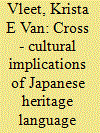

|
|
|
|
|
| Publication |
2010.
|
| Summary/Abstract |
Scholars of regions where multiple languages are spoken have much to gain by considering heritage language education, individual identity, and state power through these ethnographic and historical cases that focus on Japan and the Japanese diaspora. The articles in this two-part collection offer insights into the interrelationships of linguistic hierarchies and political economy, the navigation of ethnic and racial subjectivities, and the ways children and adolescents claim belonging to various communities through their linguistic practices. The articles interrogate not only heritage but remembrance and the ways individuals may produce identity through language in everyday interactions and institutional settings.
|
|
|
|
|
|
|
|
|
|
|
|
|
|
|
|
| 9 |
ID:
171367


|
|
|
|
|
| Summary/Abstract |
To accommodate the increasing share of intermittent renewable energy, options need to be evaluated to maintain a profitable, secure and sustainable energy supply. Besides energy efficiency (EE) as “first fuel”, adapting demand to meet the variable supply needs to be evaluated. We focus on concepts of energy efficiency and load flexibility (further: demand response; DR) and compare the two types of measures with respect to the diffusion of actions taken and possible drivers and barriers affecting uptake, we derive recommendations to promote the measures more effectively and synergistically. We analyse the results of a survey of more than 1500 service sector companies in Germany and supplement the results with research on German policies promoting energy efficiency and how these could also promote DR. We use logistic regression models to assess and compare influencing factors. Energy efficiency measures are much more prevalent than demand response measures, while most of the influencing factors for both are comparable. More information and standardisation will be needed to tap the demand response potential. We assume that the successful instruments and policies for energy efficiency could also be applied to foster demand response. Especially, instruments such as Energy Efficiency Networks could be redesigned to include demand response. The same holds for other established, effective regulatory instruments like energy audits, which could be enhanced by adding demand response. Although energy efficiency and demand response measures might counteract in specific cases, promoting DR measures can to a large extent built synergistically on existing energy efficiency policy.
|
|
|
|
|
|
|
|
|
|
|
|
|
|
|
|
| 10 |
ID:
044626
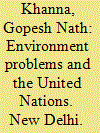

|
|
|
|
|
| Publication |
New Delhi, Ashish Publishing House, 1990.
|
| Description |
viii, 204p.
|
| Standard Number |
8170243378
|
|
|
|
|
|
|
|
|
|
|
|
Copies: C:1/I:0,R:0,Q:0
Circulation
| Accession# | Call# | Current Location | Status | Policy | Location |
| 032080 | 363.7/KHA 032080 | Main | On Shelf | General | |
|
|
|
|
| 11 |
ID:
129638
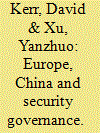

|
|
|
|
|
| Publication |
2014.
|
| Summary/Abstract |
Normative power can be defined as the ability to govern interdependencies by means of rules, regimes and compliance strategies. This paper presents two case studies in security governance-international responsibility to protect in Sudan and counter-proliferation policies towards Iran's nuclear programme-to evaluate the degree of normative convergence between China and Europe. It concludes that there are still major differences between Europe and China on employing normative strategies in security governance but that both modes of governance and identities as security actors are mobile so that the trend is towards convergence, albeit with some distance still to travel.
|
|
|
|
|
|
|
|
|
|
|
|
|
|
|
|
| 12 |
ID:
129545


|
|
|
|
|
| Publication |
2014.
|
| Summary/Abstract |
History of Russia narrated as a sequence of only horrors and failures or, on the contrary, as a continuous string of victories and successes is equally unproductive for forming the individual and collective identity.
Active patriotism is a key element of a nation's human capital. Fostering active patriotism requires a consistent policy of memory, including an integral concept of Russia's past that would meet the strategic task of developing society and the state. The past twenty years have seen inefficient and inconsistent efforts to pursue such a policy. The result has been a semi-Soviet individual with almost no links with or emotional feelings for the history of his country and with no knowledge of it. World War II remains the only basic element of the memory policy; however, its emotional impact cannot but decrease with years. An active, consistent and competent policy of memory is needed. Attempts to do without ideology and without a policy of memory have led to disastrous results as regards the moral state of society. Like the state, society has lost its development vector. Instead of creative diversity, there is a destructive chaos in people's minds.
|
|
|
|
|
|
|
|
|
|
|
|
|
|
|
|
| 13 |
ID:
125473
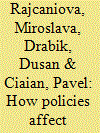

|
|
|
|
|
| Publication |
2013.
|
| Summary/Abstract |
We estimate the role of biofuel policies in determining which country is the price leader in world biofuel markets using a cointegration analysis and a Vector Error Correction (VEC) model. Weekly prices are analyzed for the EU, US, and Brazilian ethanol and biodiesel markets in the 2002-2010 and 2005-2010 time periods, respectively. The US blender's tax credit and Brazil's consumer tax exemption are found to play a role in determining the ethanol prices in other countries. For biodiesel, our results demonstrate that EU policies - the consumer tax exemption and blending target - tend to determine the world biodiesel price.
|
|
|
|
|
|
|
|
|
|
|
|
|
|
|
|
| 14 |
ID:
134204


|
|
|
|
|
| Publication |
2014.
|
| Summary/Abstract |
World War I was a decisive moment for a normative change in international law. This article will pursue a multidisciplinary approach combining study of law, politics, and history. It will cover the features of pre-World War I international law in brief, and then examine its wartime practice and discussion.
|
|
|
|
|
|
|
|
|
|
|
|
|
|
|
|
| 15 |
ID:
191335
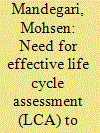

|
|
|
|
|
| Summary/Abstract |
Those jurisdictions that have been the most successful in developing low-carbon-intensity (CI) transportation fuels have used technology-agnostic policies such as Low Carbon Fuels Standards (LCFS's). However, LCFS-type policies require the accurate determination of the CI of the fuel that is produced-and-used, with Life Cycle Analysis (LCA) playing an essential role in this determination. While policies such as mandates have been successfully used to establish biofuel markets such as bioethanol in the US and Brazil, LCFS-type policies have a primary goal of reducing the carbon intensity of transportation fuels. California's LFCS (CA-LCFS) policy uses a variation of the GREET LCA model while British Columbia's LCFS (BC-LCFS) uses the GHGenius LCA, with these different models sometimes resulting in different CI outcomes for various low-CI fuels. Canada's evolving Canadian Clean Fuel Regulation (CFR) will use an OpenLCA fuel model to back-up its LCFS-type policy, with the hope that its more open-and-simple nature will encourage users to provide more up-to-date pathways and data that can be used nationally. However, the various assumptions/default values, pathways, feedstocks and local conditions that are used are known to significantly impact the results. Thus, it will be challenging to develop and use the national and international LCFS-type policies needed to decarbonize the long-distance transport sector such as aviation, marine and long-distance trucking.
|
|
|
|
|
|
|
|
|
|
|
|
|
|
|
|
| 16 |
ID:
139824
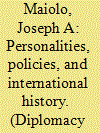

|
|
|
|
|
| Summary/Abstract |
This brief essay pays tribute to the contribution of Donald Cameron Watt (1928–2014) to the historiography of twentieth-century international history and the origins of the Second World War in Europe. It sets out his characteristic approach to the field, especially the emphasis he placed on the beliefs and perceptions of key decision-makers in the international system in explaining how and why events occurred the way they did. This essay suggests that Donald Watt’s approach to international history was shaped by the connexion he felt with the post-1919 founders of the field and by his own experiences in the immediate aftermath of the Second World War.
|
|
|
|
|
|
|
|
|
|
|
|
|
|
|
|
| 17 |
ID:
115642


|
|
|
|
|
| Publication |
2012.
|
| Summary/Abstract |
Jordan has scarce petroleum resources and hence depends to a large extent on imported crude oil, and natural gas to cover its energy needs and to generate electricity in order to cope with the growing demand. The escalating fuel prices associated with the global economic crisis have negative impacts on the economy of Jordan. However, the availability of renewable energy resources (mainly solar, and wind) supported by well-designed and ambitious incentive schemes that runs in parallel with an energy efficiency program, can contribute positively in solving the current problems. This may result in a dramatic reduction in energy bill cost for both short and long terms. Moreover, it shall result in a better and cleaner environment. In this paper an incentive policy is proposed by the Electricity Regulatory Commission (ERC) based on supporting the installation of PV generating units. ERC plays a major role in this effort which aids decision makers to adopt the proper policies in the electricity sector. It is anticipated that the implementation of this proposed policy will result in a win-win situation for both consumers and government, and will lead to increasing the energy security level in general, and electricity security in particular, within Jordan.
|
|
|
|
|
|
|
|
|
|
|
|
|
|
|
|
| 18 |
ID:
133245
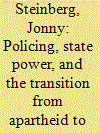

|
|
|
|
|
| Publication |
2014.
|
| Summary/Abstract |
With some exceptions, scholarship on post-apartheid policing has been too preoccupied by continuities with the apartheid era. While this is understandable, it has blinded scholars to profound changes. I argue that what has changed most since the end of apartheid is the relationship between policing and political order. During the late apartheid era, the structure and ethos of the South African Police was animated by the task of containing an insurgency. In the democratic era, policing is increasingly animated by the task of managing conflict in the ruling party. The difference is profound and the implications ripple right to the edges of the police organization, fashioning the manner in which street life is policed and impinging on the functioning and the durability of the detective service. The article concludes by arguing that instruments used in the past survive only when agents in the present find them useful, and that accounts of continuity need to train their analytical attention on the politics of the here and now.
|
|
|
|
|
|
|
|
|
|
|
|
|
|
|
|
| 19 |
ID:
126843
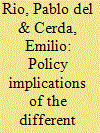

|
|
|
|
|
| Publication |
2014.
|
| Summary/Abstract |
The cost-effectiveness of support for renewable electricity is a main criterion to assess the success of policy instruments, together with effectiveness. The costs of support are also a source of significant concern for governments all over the world. However, significant confusion exists in the literature on the cost-effectiveness of public support for renewable electricity. While some authors define the concept of cost-effectiveness as that which complies with the equimarginality principle, many others, including documents from relevant organisations (European Commission, International Energy Agency, Intergovernmental Panel on Climate Change) define it as "the lowest costs of support", generally equating it with the minimisation of consumer costs. The aim of this paper is to clarify the differences between both approaches and their policy implications regarding the choice of instruments and design elements. It is shown that they partly overlap and that their policy implications clearly differ, leading to very different policy prescriptions. While the former favours technology neutral instruments and design elements, the "minimisation of consumer costs" approach favours instruments and design elements which adjust support levels to the costs of the technologies.
|
|
|
|
|
|
|
|
|
|
|
|
|
|
|
|
| 20 |
ID:
163398
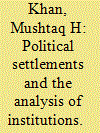

|
|
|
|
|
| Summary/Abstract |
The political settlements framework argues that the distribution of organizational power is important for understanding the economic and political effects of institutions and policies. Institutions and policies describe rules that in turn determine resource allocation, and these can affect different types of organizations in very different ways. Organizations can be expected to support, resist or distort particular institutions or policies depending on their interests and capabilities. The distribution of organizational power can therefore determine the institutions and policies that are likely to persist as well as the ones most likely to be developmental in that context. This directs our attention to the importance of accurately identifying the relative power and capabilities of relevant organizations that describe a particular political settlement and how these may be changing over time. The articles in African Affairs that have used the political settlements framework demonstrate its usefulness. In this overview we examine the motivations behind the development of the framework and some of the challenges of applying it in the context of dynamic interactions between institutions and organizations. We also discuss the most appropriate definition of a political settlement, the questions the framework is most suited to answer and the challenges ahead for developing the framework and its applications.
|
|
|
|
|
|
|
|
|
|
|
|
|
|
|
|
|
|
|
|
|